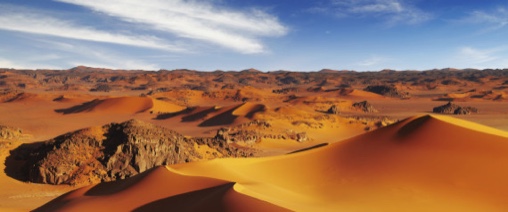
In the Sahara, two superimposed layers of fresh water exist:
• The aquifer of the albien.
• The sheet of the intercalary continental.
The albian aquifer, the world's largest freshwater reserve, spans an area between Algeria, Tunisia and Libya and contains between 30,000 - 50,000 Billion Liters of water.
The territorial distribution of the aquifer is as follows:
• Algeria: 70%.
• Libya: 20%.
• Tunisia: 10%.
More than three decades ago, this huge reservoir of groundwater allowed the human and agricultural development of the southern regions of Tunisia, Algeria and part of Libya.
Thousands of water points and wells are being exploited in these three Maghreb countries.
In the year 2000, annual withdrawals were estimated as follows :
• Algeria: 1,500 Billion liters.
• Tunisia: 0.550 Billion liters.
• Libya: 0.450 Billion liters.
In view of development programs, these quantities are bound to rise with the risk of a wild exploitation which could drastically reduce these reserves.
To this end, in April 2005, Algeria, Tunisia and Libya decided to set up a mechanism for the concerted management of their deepwater resources in the framework of a Sahel and Sahara Observatory project (OSS).
OSS is an international organization created in 1992 to combat desertification, with headquarters in Tunis since 2000, chaired alternately by Tunisia, Algeria and Libya.
Thus, an agreement was reached between Tunisia, Libya and Algeria for the equitable and reasonable management of this water table, the follow-up of which was entrusted to the OSS.
http://bit.ly/2mZN6p2
